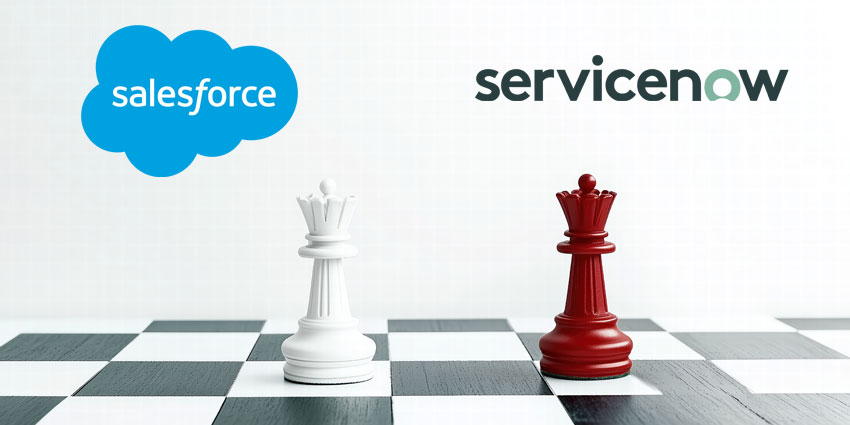Once upon a time, the gaps between Salesforce and ServiceNow were distinct.
Salesforce took charge of the customer relationship management (CRM) space, and ServiceNow led the IT service management (ITSM) market, which it helped establish.
Both companies remain head honchos in these respective fields. Yet, they are encroaching on each other.
In March 2025, Salesforce teased a major expansion into ITSM, just two months after ServiceNow officially entered the CRM market.
While ServiceNow Customer Service Management (CSM) launched all the way back in 2016, the ITSM leader had always avoided the term CRM… until January 2025.
Now, with a sales and order management solution on a unified platform with CSM, ServiceNow is making a big play for CRM market share.
In doing so, it brings product differentiators, which is new, given how most CRM entrants try to compete with Salesforce on price.
Chiefly, ServiceNow promises a more data-rich CRM experience, building workflows out to back-office systems to bolster customer profiles.
However, Salesforce’s feature-depth and rapid innovation cycle mean that poaching from its massive customer base will be no easy feat.
Key Considerations When Choosing a CRM Solution
Gartner, Forrester, ISG… There are many market evaluations from big-name research firms devised to support brands in selecting the best-placed CRM solution.
Yet, before citing these studies, brands should create a customer service vision to isolate the solution that may align best.
From there, they can assess these studies. But – while doing so – they should look beyond industry rankings and consider:
- The Vendor Ecosystem: Think about the CRM solutions leveraged by sales and marketing. Consider the integration requirements and whether – by working with the same vendors – the business can extrapolate extra value via a unified customer view.
- A Single Source of Truth: A CRM should supply teams with one set of accurate, up-to-date information. Both Salesforce and ServiceNow excel in this area, offering opportunities to unify information from various environments. Salesforce via Data Cloud, and ServiceNow via Workflow Data Fabric.
- Analytics and Data Insights: The top CRMs offer intuitive reporting and analytics. They help highlight where a company is winning, where it is falling short, and what can be done to improve. But don’t think about just easy-to-use dashboards. Instead, consider how easy it is to create a data layer that p0ols data from sales, service, and marketing in real time.
- Workflow Automation: Nobody wants to waste time on repetitive tasks, especially when an intelligent system can handle them automatically. Again, ServiceNow and Salesforce do well here, with both companies making AI agents available to service teams to automate more and lay the foundation for a hybrid human-AI workforce.
- Security and Trust: A CRM manages sensitive customer data. Any security breach undermines trust, both internally and externally. Therefore, it is crucial to look for reliable data encryption, user access controls, and other protective measures. The best CRMs roll out regular updates and security patches so companies can stay ahead of threats.
- AI Access: Think of that customer service vision; AI likely plays a massive role. But don’t just think about agentic and generative AI reducing manual workloads. AI can also predict customer outcomes, recommend new processes, and personalize interactions. Salesforce is even shaping Service Cloud – via My Service Journey – to proactively recommend a roadmap to customers of where to innovate next. Meanwhile, ServiceNow wants to power this AI with more and more data.
Salesforce vs. ServiceNow: Pros & Cons
Both Salesforce Service Cloud and ServiceNow CSM are leaders in the Gartner Magic Quadrant for CRM Customer Engagement Center (CEC) 2024.
Meanwhile, they score very similarly on verified customer review sites.
For instance, Salesforce and ServiceNow have the exact same score on G2 and Gartner’s Peer Insights.
Indeed, both hold a 4.4 out of five-star rating on G2 and a 4.3 out of five-star rating on Peer Insights.
Such industry reports and customer reviews highlight many pros and cons of the two vendors. Here’s a quick overview of those.
Salesforce Service Cloud: Pros & Cons
Across the CRM space, Salesforce outsells its closest rival (Microsoft) by four-to-one, according to 2024 research by IDC.
Salesforce supports its long-standing market dominance with a reputation for fast-paced innovation, backed up by how quickly it released agentic AI via Agentforce.
It also has a highly interoperable ecosystem, with the CRM leader rewriting all its Customer 360 apps (including Service Cloud) to ensure they interoperate, democratizing innovation across the Salesforce ecosystem.
Salesforce also offers extensive deployment resources (with lots of partners and professional services solutions) and industry-specific clouds.
Then, there are its close partnerships with the likes of AWS and Google, alongside its programs for smaller vendors in adjacent spaces to enable tight integrations. Its Bring Your Own Channel for CCaaS is an excellent example.
Finally, consider its product discovery tool, My Service Journey, which provides an overarching library of everything Service Cloud does, enabling a base for transformation projects.
As Salesforce builds this out, it will become more prescriptive, proactively recommending roadmaps based on specific business outcomes.
However, there are some cautions, too. As Service Cloud is so feature-rich, customers often only use a small percentage of what they pay for. That’s a problem My Service Journey aims to solve.
Also, on the pricing theme, users can incur extra costs for extended capabilities, like WhatsApp and SMS messages or AI-led conversations (with usage-based costs).
Across customer review sites, some users also report customization challenges, which can hamper time to value.
ServiceNow Customer Service Management: Pros & Cons
ServiceNow has only recently embraced the term “CRM”. Nevertheless, it includes everything a buyer would expect from such a customer service application.
Like Salesforce, it offers case management, knowledge management, self-service, conversational intelligence, proactive outreach, and various other solutions.
Yet, its biggest differentiator is not in its front-office capabilities. Instead, it’s in being able to unify multiple back-end workflows.
In doing so, ServiceNow connects “behind-the-scenes” processes, unlocks operational insights, and enables a richer CRM experience.
To supplement this differentiator, ServiceNow has released eight industry-specific solutions to provide more of these workflows out of the box.
Such innovation appeals to IT teams, who are enjoying greater involvement in CRM buying decisions as AI is comes to the fore.
As that trend accelerates, Service is gaining more momentum with CSM. Indeed, as Bill McDermott, CEO of ServiceNow, revealed during the company’s Q3, 2024, earnings call:
[We’re] growing faster than markets, especially the customer service management market.
However, ServiceNow does typically come with greater deployment complexity than its competitors, as brands must connect points of engagement and service across the enterprise.
Thankfully, its industry focus is helping here. Additionally, the company has argued that such complexity allows for deeper organizational connections alongside a more data-rich CRM.
Meanwhile, ServiceNow must do more to connect with front-office leaders, which requires different messaging than it’s used to with its conventional IT audience.
It still has work to do here, but is making progress.
Finally, its pricing model lacks the clarity of Service Cloud, as explored further below.
ServiceNow vs. Salesforce: The Key Comparisons
Overall, Salesforce Service Cloud may be the solution that companies looking to bolster customer engagement through front-office functionality opt for.
Brands that have also bought into its Data Cloud and Agentforce vision may also pinpoint Service Cloud as the best option – alongside those that have implemented Customer 360 apps elsewhere in the organization.
Nevertheless, those looking to reimagine how their organizations work, pulling the front and back office together, may instead select ServiceNow CSM.
That’s a high-level comparison. Here’s how both brands compare on key features, pricing, and ecosystem.
User Interface and Ease of Use
Specialist skills are likely necessary for businesses looking to configure, deploy, and use both Salesforce Service Cloud and ServiceNow CSM.
After all, both companies offer comprehensive toolkits that can create a barrier to entry for beginners and crowd the UI.
However, they both have their upsides too. For instance, Salesforce offers density settings to improve navigation (“Comfy” and “Compact”), a custom login experience, and Lightening Pages to add, move, and reorder components on record pages.
Salesforce also offers access to a massive selection of partners who can help organizations with setting up and customizing the perfect CRM.
Meanwhile, ServiceNow has simplified the process of building CRM workflows with low-code and no-code solutions, offering a vast library of pre-built integrations and templates.
Some would also argue that ServiceNow makes it easier to connect workflows across ecosystems, but some companies may still need partner support.
Both organizations offer a wide range of resources (including training courses) to assist with onboarding. Yet, Salesforce may have the edge in this regard with a more mature certifications program.
AI Capabilities
AI is everywhere, and both Salesforce and ServiceNow are racing to innovate. Both offer access to employee-facing virtual assistants alongside options for AI-driven predictive analytics and insights.
They’re also both making big moves in the agentic AI space. Salesforce has its comprehensive Agentforce platform for building agentic AI workflows from and beyond Service Cloud.
Meanwhile, ServiceNow has launched thousands of AI agents and – like Salesforce – an agent builder that service teams can leverage to create their own AI agents.
Both companies also support their AI capabilities with a customer data platform, or in ServiceNow’s case, a “Data Fabric”.
Additionally, both have partnered with NVIDIA to propel AI their innovation forward. ServiceNow appears to have a slightly closer relationship with the AI computing leader, which could accelerate its AI innovation cycle.
That’s perhaps evident in a March 2025 announcement from the companies when they teamed up on agentic AI evaluation tools.
However, Salesforce’s use of AI – through My Service Journey – to create a more prescriptive Service Cloud that recommends the next best feature to add – based on predictive outcomes – is visionary.
A Pricing Comparison
Salesforce typically uses a per-user, per-month model with tiered offerings and optional add-ons.
Pricing starts at the “Starter Suite” for $25 per user, billed either monthly or annually.
Mid-tier choices like the “Pro Suite” comes at $100 per user/month.
Then, there’s the “Enterprise” option (USD 165 per user/month) that adds more customization, AI features, and integrated analytics.
At the top is “Einstein 1 Service”, at $500 per user/month for enterprises craving advanced AI, data intelligence, and Slack integration.
Notably, though, extra features, like AI agents, do incur additional costs.
ServiceNow is a little trickier to understand, with no distinct “tiers” for pricing. Companies need to contact the team for a custom quote based on the features they need.
Gartner notes that many companies struggle to understand ServiceNow’s pricing models.
Ecosystem and Integrations
Salesforce provides a comprehensive ecosystem and robust set of integrations via AppExchange.
The marketplace includes thousands of business apps covering everything from accounting to project management.
It has also rewritten all its Customer 360 apps to share the same code base, enabling greater interoperability.
Meanwhile, its first-party ecosystem includes Slack, MuleSoft, and Tableau, with Salesforce improving the interoperability of these solutions with Service Cloud to unlock further benefits for customers.
For instance, agents may share cases from Service Cloud to back office experts on Slack to aid resolution rates.
Meanwhile, ServiceNow has refurbished its ServiceNow Store for the AI agent era.
In doing so, customers may now access not only third-party apps but third-party AI agents.
Moreover, the store has a native virtual assistant to help ServiceNow customers isolate the best-placed solutions for their operations.
In terms of its CRM ecosystem, by offering CSM on the same platform as its sales and order management solutions, ServiceNow claims to be: “The only platform that handles sales, fulfillment, and service on a single, unified platform.”
That said, ServiceNow doesn’t offer a first-party marketing CRM on that platform, like Salesforce. Although, it does have a close relationship with Tenon, which has built such a solution on ServiceNow.
As ServiceNow continues its acquisition streak, look out for that to be a potential acquisition.
After all, its early 2025 roll-ups of Moveworks, CueIn, and Logik all seem to bolster its CRM mission.
For instance, via its Moveworks acquisition, ServiceNow aims to “add back-office intelligence to each action and support reps in the flow of their work”, among other objectives.
ServiceNow vs. Salesforce: Final Thoughts
Choosing the best CRM for customer service has become increasingly complex, thanks to the prospect of AI transforming the space.
Salesforce might have a long-standing reputation as a leader in this space, but ServiceNow is on a mission to challenge its market dominance.
ServiceNow’s aspirations are lofty, given how others – like Microsoft – have all failed to make inroads on Salesforce’s CRM leadership.
Nevertheless, by bringing enterprise workflows together with key front-office data sources, ServiceNow can challenge market stalwarts.
Some may argue that Pegasystems has already challenged Salesforce in this way. Yet, ServiceNow’s advocates in IT will go a long way to supporting its market charge.
Ultimately, any company’s decision will depend on what they really need.
For those looking for slightly more straightforward pricing and comprehensive front-office features, Salesforce is perhaps the winner.
However, ServiceNow could quickly rise with data-rich messaging, cross-department workflow expertise, and agentic AI prowess.
Join the CX Community That Values Your Voice
This is your space to speak up, connect, and grow with thousands of CX leaders. Share your voice, influence what’s next, and learn from the best in customer experience. Join the conversation today.







